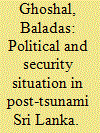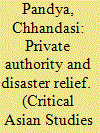| Srl | Item |
| 1 |
ID:
085872


|
|
|
|
|
| Publication |
2009.
|
| Summary/Abstract |
The tsunami of December 2004 caused massive human suffering and physical destruction. In its aftermath, images of helpless victims dominated public opinion and contributed to the generation of resources for the reconstruction of the affected areas. Critics soon pointed to another tsunami, this time in the form of global aid sweeping away local capacities. However valid these objections, they paid little attention to the ways in which the recipient women and men made use of the aid in both strategic and more subtle forms of self-positioning. This article aims at a contextualized description of post-tsunami processes and asks how external interventions interacted with local agendas. Gender relationships in particular are seen as informing both intervention models and local coping processes, and of being themselves in constant transformation within a wider frame of social change.
|
|
|
|
|
|
|
|
|
|
|
|
|
|
|
|
| 2 |
ID:
059779


|
|
|
|
|
| Publication |
Jan-Feb 2005.
|
|
|
|
|
|
|
|
|
|
|
|
|
|
|
|
| 3 |
ID:
072691


|
|
|
|
|
| Publication |
2006.
|
| Summary/Abstract |
This article explores the rise of private authority in globalized disaster relief scenarios by looking at the case of nongovernmental organizations (NGOs) operating in Aceh and its neighboring region, Nias, after the December 2004 Indian Ocean tsunami. The author places the growing strength and presence of NGOs within the larger context of weak, cash-strapped local governments under decentralization schemes promoted by neoliberal economic policies and argues that under such conditions, private actors such as NGOs are gaining a legitimacy of authority once reserved exclusively for the state. In Aceh after the tsunami, five hundred NGOs began operating relief and recovery efforts on the island with little consultation with local Acehnese government agencies and community organizations. The article concludes by arguing that the example of Aceh, in which public and private parallel systems of relief and recovery have been operating raises long-term issues of accountability for all parties involved.
|
|
|
|
|
|
|
|
|
|
|
|
|
|
|
|